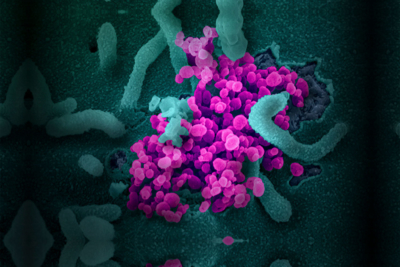
Public health, engineering, policy, psychology and microbiology experts are all coming together to study the problems caused by the coronavirus. (Image/National Institutes of Health)
USC’s research enterprise has expanded to meet the challenge of the novel coronavirus as scientists rally to understand how this pandemic is ravaging the human body, mental health, families and society.
In six months, USC researchers have mobilized in response to the disease, with the USC Office of Research dedicated $1.7 million to fund the fight against COVID-19.
The fund is helping more than two dozen research projects aimed at advancing our knowledge of the novel coronavirus, including:
- Using L.A. transportation data to better understand the pathways of disease transmission. This joint project with the USC Viterbi School of Engineering, the USC Price School of Public Policy and the L.A. County Department of Public Health will also study where to best locate drive-thru testing sites.
- Using human-centric artificial intelligence and tools developed by USC’s Information Sciences Institute to assess the health and well-being of health care workers.
- Determining how the pandemic affects pregnancy, a mother’s mental health, and both the parents’ and infant’s well-being. This project is taking place at the USC Dornsife College of Letters, Arts and Sciences.
“The COVID-19 pandemic threatens to overwhelm our health care system and is destroying lives,” said USC Provost Charles Zukoski. “Mitigating these events and developing strategies for recovery require groundbreaking discoveries — the sort of work in which USC excels.
“I am enormously proud of the work being done to develop treatments and a vaccine against this virus and to understand the impact of COVID-19 on different communities that are being supported through the USC Office of Research. Our faculty seek knowledge and develop solutions that improve the human condition and change the world.”
The efforts mark a pivot to leverage assets at one of the country’s top research universities to understand the disease and find treatments. The work includes psychologists, computer scientists, public policy experts, engineers, pharmacologists, sociologists, chemists, linguists and more. Funding comes from the Office of the Provost, the Academic Senate, USC Viterbi’s Ming Hsieh Institute and the USC Stevens Center for Innovation, among others.
COVID-19 research “has united USC … like never before”
Meanwhile, the Keck School of Medicine of USC’s COVID-19 Research Task Force, launched in March, involves dozens of clinicians, epidemiologists, stem cell researchers and community medicine experts.
The efforts around COVID-19 are an example of convergent sciences, using diverse teams of experts from across the university. Experts at the medical school have important biological samples and patient data while researchers on USC’s University Park Campus have computational and engineering talents to interpret and apply the data.
“This work has united USC in a way like never before,” said Maja Matarić, USC’s interim vice president of research. “We have more than double the grant proposals from one year ago, the researchers are charged up and USC faculty are looking for ways their expertise can be applied.”
Three professors — Neeraj Sood and Jason Doctor at USC Price and Michael Hochman of the Keck School of Medicine — are the principal investigators on one of the newly funded studies and will conduct antibody testing in poor and disadvantaged households.
COVID-19 has further exposed health disparities across American society. Essential workers in the agriculture, transportation and food service sectors, along with those in nursing home care, are at risk and often comprised of low-income people of color. The study will test for antibodies for people in up to 1,000 local households.
Another team of researchers — led by Peter Kuhn of the Convergent Science Institute in Cancer and Cyrus Shahabi at USC Viterbi — seeks to deploy a new mobile phone application to assess COVID-19 symptoms and employ geospatial mapping for disease surveillance and management.
Among the USC schools or research centers involved in the COVID-19 response include the USC Michelson Center for Convergent Bioscience; the Spatial Sciences Institute; the USC School of Pharmacy; the USC Suzanne Dworak-Peck School of Social Work; the USC Leonard Davis School of Gerontology; and the USC Schaeffer Center for Health Policy and Economics.
— By Gary Polakovic